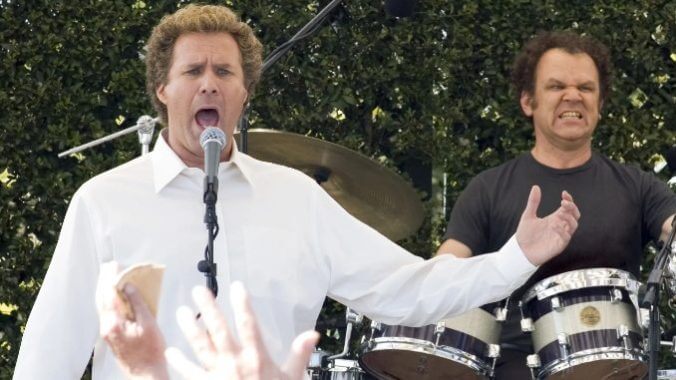Will Ferrell Has Always Deserved a Full Movie Musical

When Steven Spielberg finally made a movie musical last year, it qualified as a major event (at least for movie geeks). When Hugh Jackman translated his Broadway song-and-dance skills to the big screen, first for an adaptation of Les Misérables and then for the original musical The Greatest Showman, audiences happily queued up. Part of the excitement over these splashy entrances into the genre was that it fulfilled not just audience desire, but palpable filmmaker excitement: For much of their careers, Spielberg and Jackman seemed to be calling out to make movie musicals, and then finally made good. Yet, far less anticipation has greeted Will Ferrell’s leading role in Spirited, a musical Christmas Carol adaptation debuting on Apple TV+ following a brief, little-noticed theatrical run.
Both of these things, admittedly, sound like jokes: That someone has made another big-budget Christmas Carol musical, this time with Ferrell and Ryan Reynolds, and that anyone would get excited about Ferrell turning into a song-and-dance man. But one of the best things about Spirited is the way it provides an outlet for an aspect of Ferrell’s career that’s been staring us in the face for decades, even though he’s not particularly associated with it. From musical sojourns in his best movies (Step Brothers) and some of his worst (Holmes & Watson), to his supporting part in the ill-fated 2005 version of the Producers musical, this is clearly a man with a song in his heart.
Ferrell has been dancing and, especially, singing since his Saturday Night Live days, and from today’s vantage that doesn’t seem all that unusual; most recent seasons of SNL have at least a dozen music video parodies (Ferrell did one; a couple years ago, though he doesn’t sing in it), and John Mulaney has made musical-theater spoofs a signature recurring bit for his hosting gigs. But that theater-kid energy has not always been an SNL mainstay; originally, the show was a bit more rock-and-roll, befitting its countercultural roots. Even a figure as musty as a lounge singer would become a vessel for a sort of ironic cool in the hands of Bill Murray—and when Dan Aykroyd and John Belushi did the Blues Brothers, it was played pretty straight. Similarly, Adam Sandler’s guitar ditties (and especially the live crowd’s reception of them) stayed in the rock idiom. Ferrell’s musicality owes more to characters like the Sweeney Sisters, the Jan Hooks/Nora Dunn duo who establish a clear lineage from Murray’s Nick the Lounge Singer to Ferrell’s Marty Culp—part of a husband-and-wife duo, with Ana Gasteyer’s Bobbi Mohan-Culp. Their straight-faced approach to pop-song parodies would take on an operatic intensity, contrasting with their milquetoast, middle-school-music-teacher mildness.
That, of course, is the Ferrell sketch-comedy persona in a nutshell: The suburban dork who might fly off his hinges if certain social constructions are threatened. For characters like Craig the Spartan Cheerleader or his glorious caricatures of Neil Diamond and Robert Goulet, the mania of performing is also what seems to just barely keep them together. That even sort of holds true for Ferrell’s first big foray into cinematic musical performance: His supporting role as the Hitler-loving playwright whose work is targeted as a surefire flop in The Producers. The Broadway adaptation occasionally springs to life when Ferrell’s mania attempts to capture a cruel and senseless idolization of the Nazi regime, performing power fantasies through passionate mincing.
Ferrell would move on to another form of masculinity performed as spectacle: Professional sports. Talladega Nights, Blades of Glory and Semi-Pro don’t include any traditional musical numbers, but they’re full of showboating, and Ferrell obviously loves the idea of insecure men puffing themselves up over what amounts to an elaborate stage show—perfect for self-mockery of his dual background in performing and, in high school, being a multi-sport jock. Maybe his own early capacity for success at both sports and performing arts lent him this understanding of the squishy sensitivity lurking beneath the bravado of so many athletes; regardless, there’s something in Ferrell’s physicality—tall and strapping, but with little cartoonish accents like squinty eyes and unruly hair—that lends him a kind of parodic gracefulness. He’s great at playing athletes who don’t realize that they’re actually dancers.
That quality also lends itself well to parodying other forms of masculinity, increasingly expressed through song. It’s there in Ferrell and Adam McKay’s Anchorman, where the news team breaks into a chorus of “Afternoon Delight.”
-

-

-

-

-

-

-

-

-

-

-

-

-

-

-

-

-

-

-

-

-

-

-

-

-

-

-

-

-

-

-

-

-

-

-

-

-

-

-

-








































